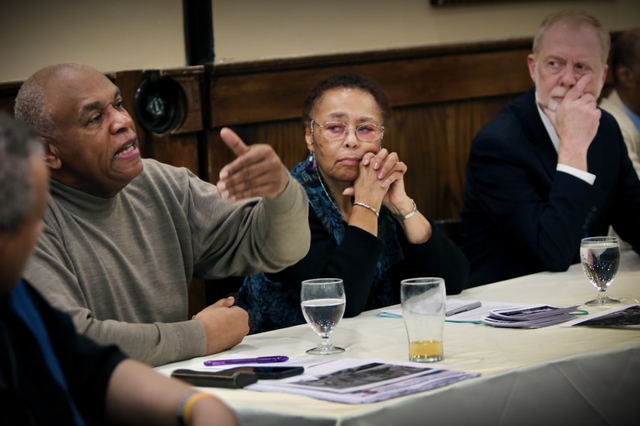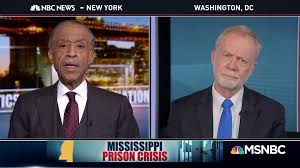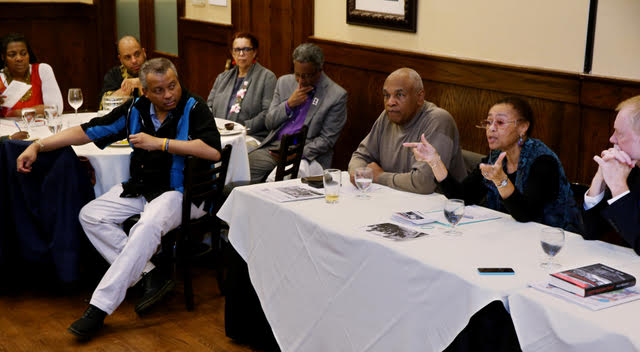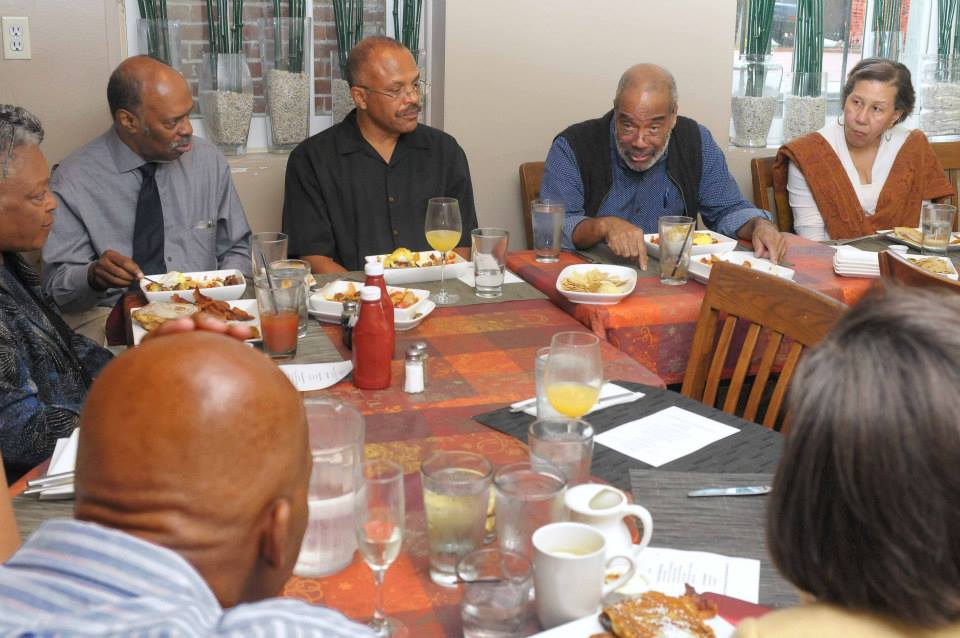Journal-isms will appear infrequently until the end of February, while its author is on vacation.
SNCC Vets Offer Advice to Today’s Young Activists
From 2014: ‘The Slaves Were Not Having Protests, but They Were Organizing Secretly’
Support Journal-isms
SNCC Vets Offer Advice to Today’s Young Activists
A lot of years were in evidence Sunday at the Black History Month edition of the Journal-isms Roundtable.
Investigative reporter Jerry Mitchell said that it took more than 30 years to write his new book, “Race Against Time: A Reporter Reopens the Unsolved Murder Cases of the Civil Rights Era,” about solving killings of the 1960s that were undertaken with the complicity of the state.
“I hope Simon and Schuster doesn’t ask me for another book,” Mitchell quipped.
Judy Richardson and Courtland Cox, veterans of the Student Nonviolent Coordinating Committee, which registered black voters in the rural South at peril of their lives, said that after 60 years together, group members know each other pretty well. They are convening in April in Washington to commemorate SNCC’s milestone anniversary.
Paul Delaney, a roundtable organizer and former senior editor at the New York Times, took us back to 1960, when SNCC moved to Atlanta, across the street from the offices of Martin Luther King Jr.’s Southern Christian Leadership Conference, and Delaney was writing for the Atlanta Daily World, part of the black press.
A first-time attendee to the roundtable marveled at how she was sitting between columnist Clarence Page, who is celebrating his 50th anniversary at the Chicago Tribune, and talk-show host Kojo Nnamdi, who spent 38 years at Howard University’s radio and television stations and 22 years at public radio station WAMU-FM, some of that time overlapping.
As 51 people gathered in a private room on the second floor of Washington’s Maggiano’s Italian Restaurant, livestreamed before 2,500 viewers, archived here by Janice Temple and photographed by Sharon Farmer, Cox and Richardson emphasized a primary lesson of their 60-year association: Recognizing the difference between protest and power.
These veterans said they wanted younger generations to receive the correct history and lessons from their experience.
“We were privileged to stand on the shoulders of those who came before. . . . I’m talking about Harriet Tubman, Frederick Douglass and so forth,” Cox told us. “All of them did the things that were necessary in their time, but they were not sufficient. . . . We engaged in sit-ins, we engaged in Freedom Rides, we engaged in what, as Judy talked about, we engaged in voter registration, we called for black power — in this town we had Drum and Spear bookstore, we had Kojo to set up a [Center for Black Education} . . . We now know that all the things that we did were necessary but not sufficient.
“Of all the things that I think were important over the past 60 years, Judy mentioned I think the thing that’s essential. Not that we had to deal with Bull Connor, not that we had to deal with all those types of people there, but that we stayed connected to each other, we stayed connected to the next generation and we always thought about what we were for, trying to build institutions that would take us to the next level. That’s the most important thing. Not who we’re against. Nor who brutalized us. . . .”
Richardson echoed that theme. The legendary SNCC organizer Ella Baker said at its first organizing meeting that it wasn’t necessarily about being able to buy the hamburger, it was having the money to buy the hamburger. “So SNCC organizers early on are talking about economic justice issues.”
The roundtable took place as an emboldened Donald Trump continued an assault on democratic institutions after his acquittal by the U.S. Senate on impeachment charges, the early stages of the Democratic presidential primaries, and newspapers under both presidential and economic assault. The McClatchy Co., owner of the Miami Herald, Kansas City Star and other newspapers, filed for protection from bankruptcy.

Mitchell, whose book is winning praise from critics, affirmed that “journalism is one of the world’s most noble professions. Democracy can’t operate without truth.” But local newspapers are in such peril that Mitchell left the Clarion Ledger, his longtime home in Jackson, Miss., and with others, formed the Mississippi Center for Investigative Reporting. They have prioritized reporting on conditions in Mississippi prisons, where at Parchman Farm alone, he said, there have been 16 violent deaths since April.
When he left the roundtable, Mitchell went to MSNBC studios to discuss the issue.
He also bemoaned the poor teaching of civil rights in schools, saying that the movement is inaccurately boiled down to “Rosa Parks sat down, and Martin Luther King stood up, and everybody got their rights, which is not only ridiculous, but not true.”
To help compensate, Mitchell posts what he calls “kind of a ‘This day in civil rights history’ ” on Facebook and Twitter, with such little-known facts as Ohio’s passage of “black codes” long before the Civil War .
Like Delaney, some SNCC leaders ended up in Washington, D.C. Many were in the early-home-rule city government of Marion Barry Jr., SNCC’s first board chairman.
Cox, who was part of the Barry administration as head of the Minority Business Opportunity Commission, noted efforts then to require that black people receive a share of government contracts and were employed by firms seeking business with D.C. But Cox said he faced resistance from media such as the Washington Post, and from prosecutors and some judges.
“They have been instruments of gentrification, they have been instruments that have been hostile to the black middle class community, and they’ve always tried to make sure that the economic power . . . has always been in the hands of the white community and not the black community.”
But Cox drew a distinction between journalists of color and editorial boards representing management.
“I want to give a shout-out to the people in this room, because . . . the sense of support that we got from a number of people in this room who I know personally and for the black press generally, I want to shout-out to the Jet magazine. It was important,” he said, referring to the views of the anti-colonial psychiatrist and philosopher Frantz Fanon, who said that “we’re like fish in the sea [in] that our ability to swim and communicate and move about is determined by the environment that we’re able to function in,” Cox said. “And your stories created narratives that allowed us to swim, and for people far beyond who we could reach to be able to think of us in a way that was helpful to them.”
The thanks were reciprocal. Randall Pinkston, a Mississippi native who has worked for CBS News and Al Jazeera America, noted that slain civil rights hero Medgar Evers put into motion events that led to Pinkston’s first broadcast job.
Evers complained about the racist Jackson, Miss., television station WLBT-TV, whose license was revoked by the Federal Communications Commission and given to black owners, who hired Pinkston. “That case is how I started, and how all the stations around the country started having black folks,” said Pinkston, who now teaches at Morgan State University. He recommended the Kay Mills book, “Changing Channels: The Civil Rights Case that Transformed Television,” for further information.
The goal is building institutions, Cox reiterated.
“It does seem to me that protests allowed us to move to the next level,” he said, “and I think now, as I talk to young people, the next level is what do we do with power. . . . Because people are so used to looking back and seeing the protests, they think that is the first and most important option.
“But I think we have now to begin to think about what do we do with power. If you go to the Mellon Foundation, it’s a black woman,” president Elizabeth Alexander. “If you go to the Ford Foundation, it’s a black man,” president Darren Walker. “You go to a number of other institutions — in fact I saw on “60 Minutes,” the guy who’s responsible for nuclear weapons, [is] in fact, a black general,” the now retired Adm. Cecil D. Haney, “so my sense is that what we have to begin to talk to young people about [how] we have done much with protests. What are we going to do as we begin to think about what are we going to do with power?
“That is to me one of the focuses we’re going to have at the SNCC 60th. . . . A whole session on the organizing tradition. We want to look at how you empower people. What are the essentials of organizing a campaign to put people in office? And how you now begin to think about budgets that act in your interests and not other people’s interests?. . . .”

Young people are beginning to see the shortcomings of relying on social media, Richardson said, and to realize the importance of voting. “They need to see that voting affects the people such as the board of education, local judges, people who interact with their daily lives. So they can’t keep talking about ‘the War of Northern Aggression’ in the textbooks. They need to see all the levels of government in direct relation to their lives. . . .
“One of the things young people see with us is, we knew how to go door to door. . . . for those who think it’s all about protest, that you can get 2,000 people out on a demonstration . . . We understood that that’s not where you show success, that people have to see who you are.
“When we were organizing in the South, you would go on people’s porches. And sometimes you would sit there for a week. Go back and forth, back and forth, before you even talked about trying to register to vote. ‘Cause they need to see you in your eyes, they need to judge you themselves. And you can’t do that on social media. What’s lovely is that a lot of the younger people are moving away from that, and what they [want from] us, is how do you get beyond that social media. . . .”
The first roundtable took place in May 1999 — 2019 was its 20th anniversary year — with Alice Bonner, Betty Anne Williams, Bobbi Bowman, Richard Prince and Bill Alexander. The purpose was to commemorate Bonner’s return to Washington after obtaining a Ph.D at the University of North Carolina, Chapel Hill. Delaney, Jessica Lee and the late Walt Swanston-NuevaEspana were also among the early founders.
When Bonner left again in 2000, this time to teach at the University of Southern California, she asked that we keep the gatherings going while she was gone, and we have. Some of the faces at the dinner gatherings have changed, but the enthusiasm for the fellowship has only grown.
The organizing committee consists of Prince, Williams, Delaney and Ivan Roman.
- Allison Keyes, CBS News Radio: Weekend Roundup
- Jerry Mitchell with Tom Hall and Kathleen Cahill, WYPR-FM, Baltimore: Jerry Mitchell’s Race Against Time: Solving the Unsolved Murders of the Civil Rights Era (audio)
- Journal-isms: What New Civil Rights Thrillers Can Tell Us About the News Media (Jan. 13)
- Randall Pinkston, Al Jazeera America: Writing Wrongs; a reporter’s extraordinary journey (on Jerry Mitchell, 2016) (video)
From 2014:
‘The Slaves Were Not Having Protests, but They Were Organizing Secretly’

“News is shaped by what’s left out. The same thing is true of history.” Thus began Charles E. Cobb Jr., journalist, veteran of the Student Nonviolent Coordinating Committee and author of “This Nonviolent Stuff’ll Get You Killed: How Guns Made the Civil Rights Movement Possible.”
He called his book an attempt to fill in the gaps about the Southern Movement and this history.
Most of the history of the civil rights movement is about protest, about what happened in urban areas and about leaders.
But that misses what was going on in rural areas and community organizing. “You have to look past protest marches and sit-ins,” Cobb said. “The slaves were not having protests, but they were organizing secretly,” planning revolts and sabotage.
To talk about guns in the movement, you have to talk about the rural South. “Guns fed people,” he said, “so naturally it was part of the culture.” People used guns to hunt for food. “They didn’t see any contradiction doing this. They saw themselves as part of the movement while they were cleaning their Winchesters. They used them to put food on the table.” Only a small portion of those in the movement were actually committed to nonviolence. Others, such as himself, favored it as a tactic not because of principle, but because it was working.
Martin Luther King Jr. applied for a concealed gun permit in 1956. “That’s what I learned: guns don’t kill people, people kill people. In the South, I never [stayed] with a family that didn’t have a gun. I worried about guns in [white people’s] hands,” not black people’s. This [view] helps you understand that these were working, ordinary people — sharecroppers, maids, cooks, mechanics. . . . who carried on the civil rights movement.
“People in the 21st century don’t understand how murderous the South was. We’re talking about violence and murder. People killed you for things that we think of as routine today.”
A discussion followed about the creation of the Deacons for Defense and Justice, organized by World War II and Korean war veterans to protect civil rights workers and African Americans trying to register to vote .
Milton Coleman asked how coverage by white journalists who made their names with their reports, such as Dan Rather, affected how people see the civil rights movement and the southern freedom movement. Coleman also wanted to know how Cobb viewed President Lyndon Johnson’s signing of the Civil Rights Act politically — losing the South for the Democrats since then and leading to today’s Tea Party and Republican dominance in the region.
Cobb replied that television always goes for the drama, and that’s what drove the coverage. To cover the organizing behind it was considered dull and boring. There was no violence in the black community.
“The only point in which we have contact with whites is when we bring people to the county courthouse. Guys like Rather ignored most of the work.” That resulted in an incomplete definition of what the movement was about and made [important people] invisible. He quoted again Julian Bond’s comment about how Americans are taught about the civil rights movement: “Rosa Parks sat down, Martin Luther King stood up and the white folks saved the day.”
Cobb said he wasn’t so sure that losing the South for the Democrats wasn’t already under way before the Civil Rights Act and the Voting Rights Act. It started with the switch of blacks from the party of Lincoln to the party of Franklin D. Roosevelt and the New Deal. White Southern Democrats were upset with the Democratic Party then, leading to the Dixiecrats of 1948. He recommends the book “Defending White Democracy” by Jason Morgan Ward.
In addition, the all-white Mississippi Democratic Party delegation at the 1964 convention, challenged by the Mississippi Freedom Party, was committed to Republican nominee Barry Goldwater (!) In his book, Cobb points out that Goldwater received more than 87 percent of the Mississippi vote in the November election.
“By that time the process was irreversible.”
The recent situation in Ferguson, Mo., is a “classic example of abysmal black leadership.” Only 6 percent of black voters are registered. Black leadership failed to organize black people. National black leaders parachute in and out, but are not around to do the organizing. How are they “black leaders”? “I don’t know why Martin Luther King III is a leader, or why Al Sharpton is a leader.”
Cobb disclosed that actors Fred Williamson and Jim Brown helped finance getting guns to the Deacons for Defense and Justice in Bogalusa, La. He doesn’t think this has been written about.
“We in SNCC are all political children of Ella Baker,” who organized SCLC. He went on to underscore her significance as inspiration and organizer.
He also notes the bravery of Hazel Brannon Smith, a white Southerner who became the first woman to win the Pulitzer Prize for editorial writing. She favored “fairness” and answered the question, “How can a lady like you” produce such editorials? “I’m not a lady, I’m a newspaperwoman,” she replied. Her obit.
Noting that with Paul Delaney and Joe Davidson, three founders of the National Association of Black Journalists, were in the room, Richard Prince asked whether NABJ had a relationship to the civil rights movement, as some have characterized it. Cobb said he was working at Washington’s WHUR-FM, the commercial Howard University station, when NABJ was founded, and at the time believed “anything in which black people organized themselves was worthwhile.” Delaney expanded on the organizing meeting, in which disc jockeys, advertising people, academics and public relations people were disqualified from membership.
Cobb returned to the importance of organizing when asked about how the civil rights movement is remembered today and its lessons for today’s issues. If the people of Mississippi could make the progress they did through organizing, that should be a lesson for us today. “More important is the challenges black people make to other black people,” he said. “Challenge black people. Tell them there is no excuse for you not standing up for yourself. That’s the great lesson of the Movement,” he said.
Cobb also gave us this bit of news:
“The SNCC Legacy Project or SLP (a formally organized tax exempt educational group of some of us SNCC veterans) has reached formal agreement with Duke University to develop a pilot web site around SNCC and organizing for voter registration. It will be up and accessible to anyone on March 15, 2015. The focus will be on Mississippi, Southwest Georgia and Lowndes County, Alabama, three areas where SNCC concentrated its efforts with much success.
“I am on Duke’s campus for the next three months as a ‘scholar activist’ to supervise content and writing. Hopefully this will lead to other projects with Duke and as well model the kinds of relationships movement veterans can develop with colleges and universities.”
The first roundtable took place in May 1999 with Alice Bonner, Betty Anne Williams, Bobbi Bowman, Richard Prince and Bill Alexander. The purpose was to commemorate Bonner’s return to Washington after obtaining a Ph.D at the University of North Carolina, Chapel Hill. Delaney, Jessica Lee and Walt Swanston were also among the early founders.
When Bonner left, she asked that we keep the gatherings going while she was gone, and we have. Some of the faces at the dinner gatherings have changed, but the enthusiasm for the fellowship has only grown.
Further reading:
Eugene Volokh, Washington Post: The Volokh Conspiracy
From Charles E. Cobb Jr., on ‘the challenge of Ferguson’ (Aug. 19)
The Volokh Conspiracy
Standing our ground (July 29)
The Volokh Conspiracy
Strong men keep a-comin’ on (July 30)
Eugene Volokh, Washington Post: The Volokh Conspiracy
Charles E. Cobb Jr. guest-blogging about “This Nonviolent Stuff’ll Get You Killed” (July 27)
Originally published on Facebook with additional photos.
Facebook users: “Like” “Richard Prince’s Journal-isms” on Facebook.
Follow Richard Prince on Twitter @princeeditor
Richard Prince’s Journal-isms originates from Washington. It began in print before most of us knew what the internet was, and it would like to be referred to as a “column.” Any views expressed in the column are those of the person or organization quoted and not those of any other entity. Send tips, comments and concerns to Richard Prince at journal-isms-owner@yahoogroups.com
View previous columns (after Feb. 13, 2016).
- Diversity’s Greatest Hits, 2018 (Jan. 4, 2019)
- Book Notes: Is Taking a Knee Really All That? (Dec. 20, 2018)
- Book Notes: Challenging ’45’ and Proudly Telling the Story (Dec. 18, 2018)
- Book Notes: Get Down With the Legends! (Dec. 11, 2018)
- Journalist Richard Prince w/Joe Madison (Sirius XM, April 18, 2018) (podcast)
- Richard Prince (journalist) (Wikipedia entry)
- February 2018 Podcast: Richard “Dick” Prince on the need for newsroom diversity (Gabriel Greschler, Student Press Law Center, Feb. 26, 2018)
- Diversity’s Greatest Hits, 2017 — Where Will They Take Us in the Year Ahead?
- Book Notes: Best Sellers, Uncovered Treasures, Overlooked History (Dec. 19, 2017)
- An advocate for diversity in the media is still pressing for representation, (Courtland Milloy, Washington Post, Nov. 28, 2017)
- Morgan Global Journalism Review: Journal-isms Journeys On (Aug. 31, 2017)
- Diversity’s Greatest Hits, 2016
- Book Notes: 16 Writers Dish About ‘Chelle,’ the First Lady
- Book Notes: From Coretta to Barack, and in Search of the Godfather
- Journal-isms’ Richard Prince Wants Your Ideas (FishbowlDC, Feb. 26, 2016)
- “JOURNAL-ISMS” IS LATEST TO BEAR BRUNT OF INDUSTRY’S ECONOMIC WOES (Feb. 19, 2016)
- Richard Prince with Charlayne Hunter-Gault,“PBS NewsHour,” “What stagnant diversity means for America’s newsrooms” (Dec. 15, 2015)
- Book Notes: Journalists Follow Their Passions
- Book Notes: Journalists Who Rocked Their World
- Book Notes: Hands Up! Read This!
- Book Notes: New Cosby Bio Looks Like a Best-Seller
- Journo-diversity advocate turns attention to Ezra Klein project (Erik Wemple, Washington Post, March 5, 2014)
Columns below from the Maynard Institute are not currently available but are scheduled to be restored soon on journal-isms.com.
- Book Notes: “Love, Peace and Soul!” And More
- Book Notes: Book Notes: Soothing the Senses, Shocking the Conscience
- Diversity’s Greatest Hits, 2015
- Diversity’s Greatest Hits, 2014
- Diversity’s Greatest Hits, 2013
- Diversity’s Greatest Hits, 2012
- Diversity’s Greatest Hits, 2011
- Diversity’s Greatest Hits, 2010
- Diversity’s Greatest Hits, 2009
- Diversity’s Greatest Hits, 2008
- Book Notes: Books to Ring In the New Year
- Book Notes: In-Your-Face Holiday Reads
- Fishbowl Interview With the Fresh Prince of D.C. (Oct. 26, 2012)
- NABJ to Honor Columnist Richard Prince With Ida B. Wells Award (Oct. 11, 2012)
- So What Do You Do, Richard Prince, Columnist for the Maynard Institute? (Richard Horgan, FishbowlLA, Aug. 22, 2012)
- Book Notes: Who Am I? What’s Race Got to Do With It?: Journalists Explore Identity
- Book Notes: Catching Up With Books for the Fall
- Richard Prince Helps Journalists Set High Bar (Jackie Jones, BlackAmericaWeb.com, 2011)
- Book Notes: 10 Ways to Turn Pages This Summer
- Book Notes: 7 for Serious Spring Reading
- Book Notes: 7 Candidates for the Journalist’s Library
- Book Notes: 9 That Add Heft to the Bookshelf
- Five Minutes With Richard Prince (Newspaper Association of America, 2005)
- ‘Journal-isms’ That Engage and Inform Diverse Audiences (Q&A with Mallary Jean Tenore, Poynter Institute, 2008)
